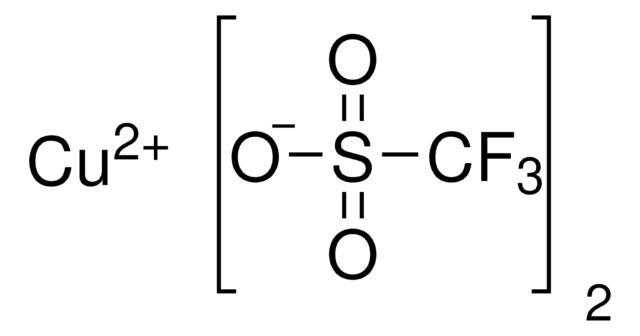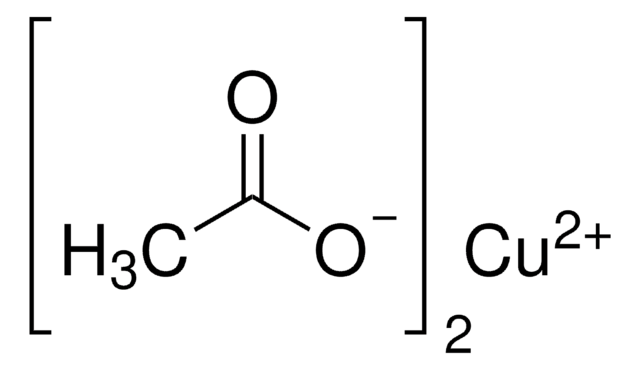215392
Copper(II) perchlorate hexahydrate
98%
Synonym(s):
Cupric perchlorate hexahydrate
About This Item
Recommended Products
grade
for analytical purposes
Quality Level
Assay
98%
form
crystalline
reaction suitability
reagent type: oxidant
density
2.225 g/mL at 25 °C (lit.)
application(s)
battery manufacturing
SMILES string
O.O.O.O.O.O.[Cu++].[O-]Cl(=O)(=O)=O.[O-]Cl(=O)(=O)=O
InChI
1S/2ClHO4.Cu.6H2O/c2*2-1(3,4)5;;;;;;;/h2*(H,2,3,4,5);;6*1H2/q;;+2;;;;;;/p-2
InChI key
NHELIHXBJRANPL-UHFFFAOYSA-L
Looking for similar products? Visit Product Comparison Guide
General description
Application
- Methanol[1-(methoxymethanimidoyl)-2-(pyridin-2-ylmethyl)guanidine]bis(perchlorato)copper(II).: This study reports the synthesis and crystal structure of a new copper(II) complex with potential applications in materials science and catalysis. The research focuses on the structural characterization of the complex, which is crucial for understanding its reactivity and potential uses in various chemical processes (Meenongwa et al., 2012).
- Oxidative cleavage of DNA by a dipyridoquinoxaline copper(II) complex in the presence of ascorbic acid.: This research explores the catalytic activity of a copper(II) complex in oxidative DNA cleavage. The findings demonstrate the complex′s potential application in biochemical studies and the development of new catalytic processes for DNA manipulation and analysis (Santra et al., 2002).
Signal Word
Danger
Hazard Statements
Precautionary Statements
Hazard Classifications
Eye Irrit. 2 - Ox. Sol. 2 - Skin Irrit. 2 - STOT SE 3
Target Organs
Respiratory system
Storage Class Code
5.1A - Strongly oxidizing hazardous materials
WGK
WGK 3
Flash Point(F)
Not applicable
Flash Point(C)
Not applicable
Personal Protective Equipment
Choose from one of the most recent versions:
Already Own This Product?
Find documentation for the products that you have recently purchased in the Document Library.
Customers Also Viewed
Global Trade Item Number
| SKU | GTIN |
|---|---|
| 215392-500G | |
| 215392-5G | 4061838773692 |
| 215392-100G | 4061838773685 |
Our team of scientists has experience in all areas of research including Life Science, Material Science, Chemical Synthesis, Chromatography, Analytical and many others.
Contact Technical Service













